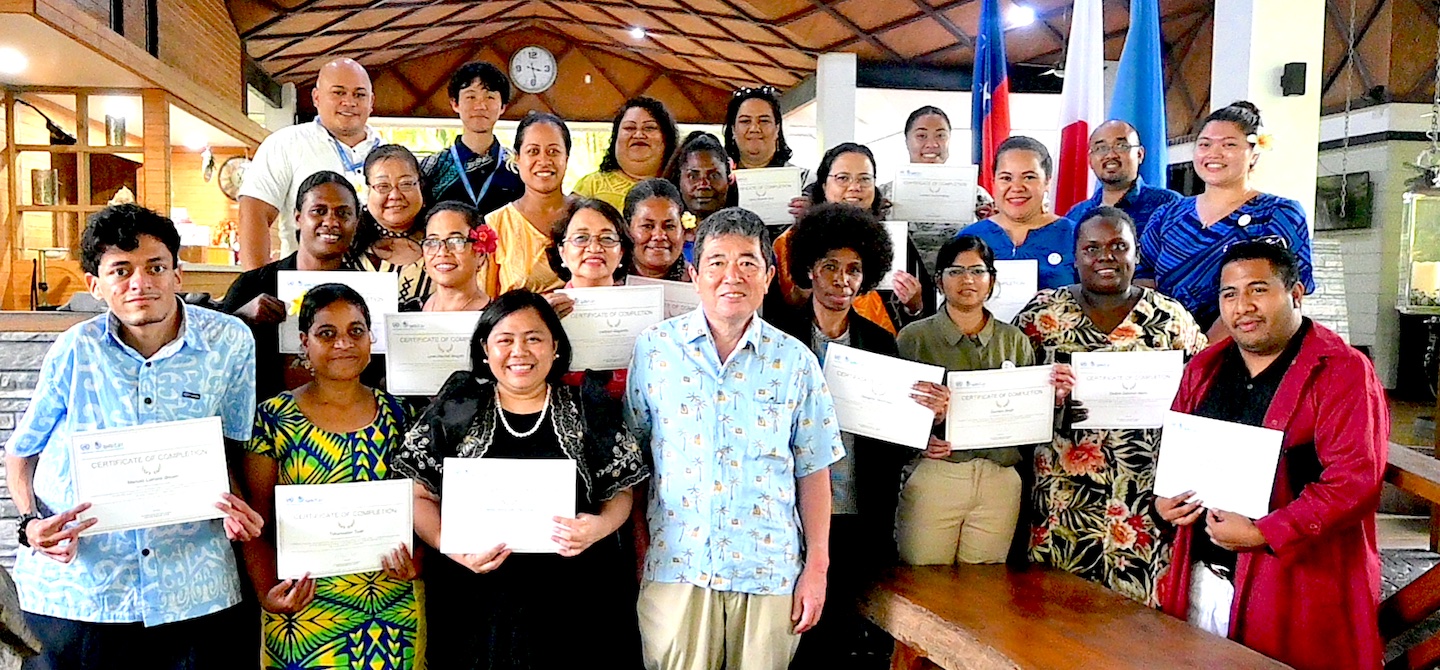By Maria Koreti Lemisio-Sang Yum
As all good things must come to an end, so has the first in-person training programme for Women’s Leadership in Tsunami-based Disaster Risk Reduction (DRR) concluded on March 11th, 2023, after 5-days of knowledge sharing and capacity building on DRR-related issues, collaborating and building supportive networks, and participating in community and site immersions.
Under the United Nations Institute of Training and Research (UNITAR) Division for Prosperity, Samoa was selected to host eighteen participants from nine countries in training and equipping future leaders from Asia and the Pacific with skills that will contribute to creating inclusive and resilient societies. The participants hailed from Fiji, India, Kiribati, Federated States of Micronesia, Papua New Guinea, Philippines, Samoa, Solomon Islands and Tonga. This decision brought about successful partnerships with various experts and resource persons from government ministries and regional organisations, on the island, that had all contributed to providing multidisciplinary perspectives and context-based scenarios resulting in effective dialogue in preparing, responding, and recovering from the exposure to a natural hazard.
Samoa was very fortunate enough to have hosted the very first in-training programmes outside of Japan and in the Pacific region. As the participants can attest, Samoa is on the right track in implementing gender-inclusive and effective place-based approaches for DRR and climate-induced hazards. However, there is still more work to be done as hazards continue to intensify and occur frequently in the Asia and Pacific regions. The daily sessions during the programme demonstrated the cohesive coordination and communication among stakeholders and village groups in Samoa, the significance of working with the community, and the value of having women leaders at the forefront of DRR dialogue and planning.

The Ambassador of Japan to Samoa – H.E Mr Keisuke Senta, gave the official statement for the program, in which he opened with a Samoan proverb or alagaupu “O le tele o lima e māmā ai se avega” translating to, many hands will lessen the load, in reference to the effectiveness of collective and inclusive action which can be applied in DRR planning.
The closing ceremony commemorated the devastating Great East Japan Earthquake and Tsunami that affected the Tohoku, Japan on March 11th, 2011. A moment of silence was observed at 2:46 pm, the moment when Tohoku was struck by the deadly magnitude 9.0 Earthquake and Tsunami, to honour all the lives affected and lost. Yoshie Kaneko and Yosuke Takahashi, staff members of a Japan-based NGO, Retreat and Yappesu (translated to working together) joined the ceremony virtually. The ambassador’s official statement was a message of light and hope in moving forward and learning from Japan’s road to recovery.
The ending of the training programme is just the beginning for the participants as they journey back to their homes to continue the work that they do in their respective fields equipped with more awareness, knowledge, and skills to implement better outcomes in disaster risk reduction and management. It goes without saying “You educate a woman; you educate a generation.”
The ceremony concluded with the awarding of certificates of completion to the participants.
With the assistance of the Government of Japan, and under the UNITAR Division of Prosperity, plans for the next UNITAR Women’s Leadership Training Programme, are in discussion with hopes of continuing the in-person training in the South Pacific region.
